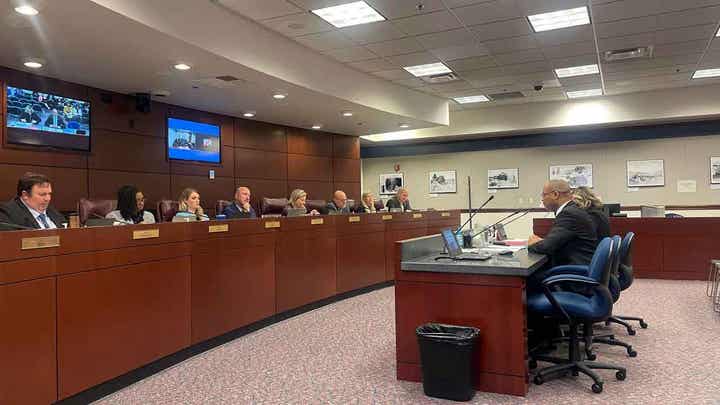France Debates Harsher Penalties For Juvenile Delinquency

Table of Contents
The Current State of Juvenile Delinquency in France
Recent statistics paint a concerning picture of juvenile delinquency in France. Youth crime rates have seen a steady increase over the past five years, with certain regions and demographics disproportionately affected. While theft and vandalism remain common offenses, there's also a worrying rise in more serious violent crimes committed by young people. Socio-economic factors play a significant role; high levels of poverty, unemployment, and social inequality in certain areas are strongly correlated with increased juvenile crime rates. The existing juvenile justice system, some argue, is ill-equipped to handle this escalating problem, leading to calls for reform.
- Increase in youth crime rates over the past 5 years: Official government data shows a consistent upward trend.
- Specific regions or demographics disproportionately affected: Data reveals disparities, with certain urban areas and marginalized communities showing higher rates of juvenile crime.
- Examples of high-profile juvenile crime cases: Recent high-profile incidents have fueled public anxiety and calls for tougher measures.
- Analysis of existing juvenile justice system's shortcomings: Critics point to issues such as overcrowding in juvenile detention centers and a lack of adequate rehabilitation programs.
Proposed Harsher Penalties and Their Rationale
In response to rising public concern, several legislative proposals aim to increase penalties for juvenile offenders in France. These include lowering the age of criminal responsibility, increasing the use of detention for juvenile offenders, and implementing tougher sentencing guidelines for specific crimes. Proponents of harsher penalties argue that such measures will deter crime, protect public safety, and send a strong message that criminal behavior will not be tolerated. However, concerns are raised about the potential negative impact on rehabilitation efforts and the long-term consequences of a more punitive approach.
- Lowering the age of criminal responsibility: This is a highly debated proposal, with concerns about its impact on young offenders' development and future prospects.
- Increased use of detention for juvenile offenders: Critics argue that detention can be counterproductive, potentially increasing recidivism rates.
- Tougher sentencing guidelines for specific crimes: While aimed at addressing specific offenses, such measures might disproportionately affect vulnerable youth.
- Arguments for a more punitive approach to youth crime: Proponents often emphasize the need for swift and certain punishment to deter future crime.
Opposition to Harsher Penalties and Alternative Approaches
Opponents of harsher penalties argue that increasing punishment alone is not a sustainable solution. They highlight the potential for increased recidivism rates and the detrimental impact on the rehabilitation and reintegration of young offenders. Instead, they advocate for alternative strategies focused on prevention and rehabilitation. These include investing in youth support services, addressing underlying social issues contributing to youth crime, and implementing community-based programs. A crucial element is the recognition that effective crime reduction necessitates tackling the root causes of juvenile delinquency.
- Focus on rehabilitation and restorative justice programs: These programs aim to address the underlying causes of criminal behavior and help young offenders reintegrate into society.
- Investment in youth support services (education, social work): Improved access to education, mentoring, and social work support can significantly reduce the likelihood of youth involvement in crime.
- Addressing poverty and social inequality: Tackling the socio-economic factors that contribute to juvenile delinquency is crucial for long-term solutions.
- Community-based programs to prevent crime: These programs, such as after-school activities and youth centers, offer positive alternatives to criminal activity.
The Role of Education and Social Support
Early intervention programs and educational initiatives are paramount in preventing juvenile delinquency. Improved access to resources, including after-school programs, mentorship initiatives, and mental health services for youth, can make a significant difference. Investing in these areas is not just a social responsibility but a strategic investment in a safer future.
- Funding for after-school programs: Providing structured activities and supervision can keep young people engaged and away from negative influences.
- Mentorship initiatives: Positive adult role models can significantly impact the lives of at-risk youth.
- Improving access to mental health services for youth: Addressing underlying mental health issues can prevent criminal behavior.
Long-Term Implications and International Comparisons
Implementing harsher penalties for juvenile delinquency in France has potential long-term consequences that need careful consideration. A purely punitive approach might lead to higher recidivism rates and increased costs associated with incarceration. A comparative analysis of juvenile justice systems in other European countries can offer valuable insights. Some countries have achieved success with preventative measures and rehabilitative programs, while others have adopted harsher approaches with varying results. This comparative analysis can inform policy decisions in France.
- Impact on recidivism rates: A key metric to assess the effectiveness of different approaches to juvenile delinquency.
- Cost-benefit analysis of different approaches: Considering the financial implications of various strategies is essential for resource allocation.
- Comparison with juvenile justice systems in other countries: Learning from best practices in other nations can improve France's approach.
Conclusion
The debate surrounding juvenile delinquency in France highlights the complexities of balancing effective punishment with robust rehabilitation and preventative measures. Proposed harsher penalties, while aiming to deter crime and protect public safety, raise concerns about their long-term impact on recidivism and rehabilitation efforts. Alternative approaches focusing on prevention, early intervention, and addressing underlying social issues offer a more sustainable solution. Further research and public discussion are needed to find the most effective strategies to tackle juvenile delinquency in France and create a safer future for all. Let's continue the conversation about finding the best solutions to address juvenile delinquency in France, ensuring a balanced approach that prioritizes both justice and rehabilitation.

Featured Posts
-
 Tisice Prepustenych Analyza Situacie Na Nemeckom Trhu Prace
May 24, 2025
Tisice Prepustenych Analyza Situacie Na Nemeckom Trhu Prace
May 24, 2025 -
 Museum Funding In Jeopardy Examining The Impact Of Trumps Budget
May 24, 2025
Museum Funding In Jeopardy Examining The Impact Of Trumps Budget
May 24, 2025 -
 Auto Legendas F1 Motorral Szerelt Koezuti Porsche
May 24, 2025
Auto Legendas F1 Motorral Szerelt Koezuti Porsche
May 24, 2025 -
 Sadie Sink And Mia Farrow Behind The Scenes Broadway Photo
May 24, 2025
Sadie Sink And Mia Farrow Behind The Scenes Broadway Photo
May 24, 2025 -
 Analysis Demna Gvasalias Impact On Guccis Design Direction
May 24, 2025
Analysis Demna Gvasalias Impact On Guccis Design Direction
May 24, 2025
